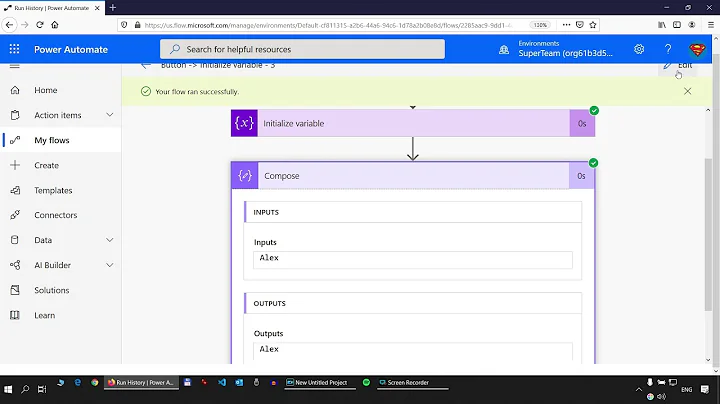Get output of `posix_spawn`
Solution 1
Here's a minimal example of modifying file descriptors of a spawned process, saved as foo.c:
#include <stdio.h>
#include <stdlib.h>
#include <sys/stat.h>
#include <fcntl.h>
#include <spawn.h>
int main(int argc, char* argv[], char *env[])
{
int ret;
pid_t child_pid;
posix_spawn_file_actions_t child_fd_actions;
if (ret = posix_spawn_file_actions_init (&child_fd_actions))
perror ("posix_spawn_file_actions_init"), exit(ret);
if (ret = posix_spawn_file_actions_addopen (&child_fd_actions, 1, "/tmp/foo-log",
O_WRONLY | O_CREAT | O_TRUNC, 0644))
perror ("posix_spawn_file_actions_addopen"), exit(ret);
if (ret = posix_spawn_file_actions_adddup2 (&child_fd_actions, 1, 2))
perror ("posix_spawn_file_actions_adddup2"), exit(ret);
if (ret = posix_spawnp (&child_pid, "date", &child_fd_actions, NULL, argv, env))
perror ("posix_spawn"), exit(ret);
}
What does it do?
- The third parameter of
posix_spwanis a pointer of typeposix_spawn_file_actions_t(one you have given asNULL).posix_spawnwill open, close or duplicate file descriptors inherited from the calling process as specified by theposix_spawn_file_actions_tobject. - So we start with a
posix_spawn_file_actions_tobject (chiild_fd_actions), and initialize it withposix_spawn_file_actions_init(). - Now, the
posix_spawn_file_actions_{addopen,addclose,addup2}functions can be used to open, close or duplicate file descriptors (after theopen(3),close(3)anddup2(3)functions) respectively. - So we
posix_spawn_file_actions_addopena file at/tmp/foo-logto file descriptor1(aka stdout). - Then we
posix_spawn_file_actions_adddup2fd2(akastderr) to fd 1. - Note that nothing has been opened or duped yet. The last two functions simply changed the
child_fd_actionsobject to note that these actions are to be taken. - And finally we use
posix_spawnwith thechild_fd_actionsobject.
Testing it out:
$ make foo
cc foo.c -o foo
$ ./foo
$ cat /tmp/foo-log
Sun Jan 3 03:48:17 IST 2016
$ ./foo +'%F %R'
$ cat /tmp/foo-log
2016-01-03 03:48
$ ./foo -d 'foo'
$ cat /tmp/foo-log
./foo: invalid date ‘foo’
As you can see, both stdout and stderr of the spawned process went to /tmp/foo-log.
Solution 2
Yes, you can. Defining the right list of posix spawn file actions definitely is the way to go.
Example:
#include <errno.h>
#include <fcntl.h>
#include <spawn.h>
#include <stdio.h>
#include <string.h>
#define CHECK_ERROR(R, MSG) do { if (R) { fprintf(stderr, "%s: %s\n",
(MSG), strerror(R)); return 1; } } while (0)
extern char **environ;
int main(int argc, char **argv)
{
if (argc < 3) {
fprintf(stderr, "Call: %s OUTFILE COMMAND [ARG]...\n", argv[0]);
return 2;
}
const char *out_filename = argv[1];
char **child_argv = argv+2;
posix_spawn_file_actions_t as;
int r = posix_spawn_file_actions_init(&as);
CHECK_ERROR(r, "actions init");
r = posix_spawn_file_actions_addopen(&as, 1, out_filename,
O_CREAT | O_TRUNC | O_WRONLY, 0644);
CHECK_ERROR(r, "addopen");
r = posix_spawn_file_actions_adddup2(&as, 1, 2);
CHECK_ERROR(r, "adddup2");
pid_t child_pid;
r = posix_spawnp(&child_pid, child_argv[0], &as, NULL,
child_argv, environ);
CHECK_ERROR(r, "spawnp");
r = posix_spawn_file_actions_destroy(&as);
CHECK_ERROR(r, "actions destroy");
return 0;
}
Compile and test:
$ cc -Wall -g -o spawnp spawnp.c
$ ./spawnp log date -I
$ cat log
2018-11-03
$ ./a.out log dat
spawnp: No such file or directory
Note that the posix_spawn functions don't set errno, instead, unlike most other UNIX functions, they return an error code. Thus, we can't use perror() but have to use something like strerror().
We use two spawn file actions: addopen and addup2. The addopen is similar to a normal open() but you also specify a file descriptor which is automatically closed if already open (here 1, i.e. stdout). The addup2 has similar effects to dup2(), i.e. the target file descriptor (here 2, i.e. stderr) is atomically closed before 1 is duplicated to 2. Those actions are only executed in the child created by posix_spawn, i.e. right before it execs the specified command.
Like fork(), posix_spawn() and posix_spawnp() immediately return to the parent. Thus, we have to use waitid() or waitpid() to explicitly wait on child_pid's termination.
Related videos on Youtube
nbubis
Updated on September 18, 2022Comments
-
 nbubis over 1 year
nbubis over 1 yearSo I can run a process in Unix / Linux using POSIX, but is there some way I can store / redirect both the STDOUT and STDERR of the process to a file? The
spawn.hheader contains a deceleration ofposix_spawn_file_actions_adddup2which looks relevant, but I'm not sure quite how to use it.The process spawn:
posix_spawn(&processID, (char *)"myprocess", NULL, NULL, args, environ);The output storage:
...?-
 Admin over 8 yearsThe third paramater of
Admin over 8 yearsThe third paramater ofposix_spwanis a pointer of typeposix_spawn_file_actions_t(one you have given asNULL).posix_spawnwill open, close or duplicate file descriptors inherited from the calling process as specified by theposix_spawn_file_actions_tobject. Theposix_spawn_file_actions_{addclose,adddup2}functions are used to indicate what happens to which fd. -
 Admin over 8 years@muru - Do you think you could add a working example? I understood the interaction between the functions is done by a "file action", but it's not clear how exactly this fits together, or where the fd location is defined.
Admin over 8 years@muru - Do you think you could add a working example? I understood the interaction between the functions is done by a "file action", but it's not clear how exactly this fits together, or where the fd location is defined.
-
-
maxschlepzig over 5 yearsNote that
posix_spawn*don't set errno. Thus, you can't useperror(). Use something likefprintf(stderr, "...: %s\n", strerror(ret))instead. Also, the main function is missing areturn 0statement. -
 Joelio about 2 yearsIn this case do you need to close the fd also?
Joelio about 2 yearsIn this case do you need to close the fd also?






